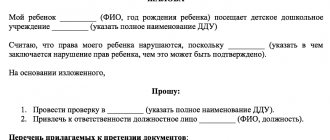To register a child for kindergarten, you need to know where and with what documents parents must apply. The sequence of your actions and the list of documents often depend on local legislation.
First of all, you need to go through the following steps:
- Contact the commission for registration;
- Monitor the progress of the queue periodically;
- Start preparing documents for enrollment in kindergarten after you receive a ticket to a child care institution.
To avoid problems, you need to know what documents are needed for the kindergarten to get on the waiting list. We recommend that you register immediately after leaving the maternity hospital and the parents receive the child’s Birth Certificate. You become registered with the territorial commission, which is responsible for staffing municipal preschool institutions. Commissions of this kind are created at the municipal education departments of the administrations of each city or district.
Here is a list of documents that need to be prepared for the commission for staffing a municipal children's educational institution (MDOU):
- Application from parents or persons in loco parentis;
- Child's birth certificate and its copy;
- Applicant's passport;
- Beneficiaries provide a document that confirms the right to priority admission of a child to a preschool institution.
By submitting an application to the commission, the applicant signs an Agreement authorizing the storage and processing of his personal data by the commission.
When the child is placed on the waiting list and registered in the record book, as well as in the computer database. You will be informed under what number the child is registered and will be given a notification of the child’s registration in exchange for a package of documents. With this notification in hand, you will be able to monitor how the queue is progressing. Keep in mind! You can register for the queue using the electronic option.
In order to get on the lists of the electronic commission for completing preschool educational institutions, you need to go through the following steps:
- Register on the site
- Provide the applicant's passport details
- Child's full name
- Child's birth certificate number
- Fill out the application form electronically
- In the application, indicate the numbers of the three kindergartens that are preferable for you.
- Receive an individual code and wait for confirmation that the application has been accepted.
- Confirmation of the child’s inclusion in the electronic register must arrive no later than 10 working days from the date of submission of the application.
When the time comes to distribute the child to a specific preschool institution, the head of the kindergarten will receive a notification from the commission and notify the applicant by mail or by telephone.
Documents for enrolling a child in a kindergarten age group
With the notification received, you need to go or call the kindergarten and find out what documents need to be prepared in order for the child to be enrolled in his age group. The list of required documents may differ slightly in different regions, but, most often, its list necessarily includes:
- Application from a parent or person replacing him/her regarding the child’s enrollment in kindergarten;
- The applicant's passport or other identification document;
- Child's birth certificate and its copy;
- Medical certificate about the child’s health from a pediatrician, form No. 026/u;
- Vaccination card form No. 063/u;
- Certificate of epidemiological environment form 095/у, which is issued by the local pediatrician. This certificate is valid for three days from the date of issue.
- Certificate for the pool, if the kindergarten offers recreational swimming classes (form No. 1). This certificate is valid for 6 months;
- Compulsory health insurance policy and its copy;
- For beneficiaries, a document that gives the right to benefits in paying for kindergarten.
The head of the preschool institution will invite you to sign a bilateral agreement between you and the preschool institution. The agreement is signed in two copies, one of which is given to the applicant.
Attention! Be prepared for the fact that before entering kindergarten you will need to undergo a medical examination by a number of specialists, take tests and wait for their results.
There are also special kindergartens for children with special needs. Such preschool institutions include:
- Kindergartens for children with cerebral palsy;
- Kindergartens for children with hearing impairments;
- Kindergartens for children with speech disorders;
- Kindergartens for children with low vision;
- Anti-tuberculosis preschool institutions;
- Children's institutions for HIV-positive children.
There are children's educational and health institutions in other areas as well.
The Supreme Court protected the child’s right to go to the nearest kindergarten
The Supreme Court declared illegal the inaction of the district administration, which was unable to provide a child with a place in a municipal kindergarten within walking distance from home. The queue for kindergarten does not excuse officials, because they must foresee the need for preschool education. Their duty is to take measures in advance to ensure that there are enough places for everyone, the Supreme Court explained with reference to the Constitutional Court Resolution No. 5-P of May 15, 2006.
The Supreme Court overturned the decisions of lower courts in the case of Elena Malyshkina* from Murin in the Leningrad region, who was unable to enroll her young son in the nearest kindergarten in 2021. The administration explained to her that there was a line and there were no places. In return, officials offered a short-term group in Murin or a kindergarten located 49 km away in another locality, the village of Lesnoye. But these options did not suit the mother, who was raising a child alone and had to start earning money, says Malyshkina’s representative Kirill Druzhinin. “In the end, she had to send her son to her grandmother in the Komi Republic, 2,300 km away, because she has no relatives in the Leningrad region,” says the lawyer.
The administration said that there were no places in the nearest kindergarten and suggested an institution 49 km from home. But this did not suit the woman because she was raising a child alone and wanted to get a job.
At the same time, the woman decided through the court to recognize the inaction of officials as illegal and force them to provide a place in a kindergarten in Murin. She insisted that an institution 49 km from home was not suitable for a child’s daily visits. But two authorities sided with the administration. In particular, they referred to paragraph 4 of Art. 67 of the Law on Education. It establishes that state or municipal educational organizations may refuse admission if there are no places. The courts also took into account that Malyshkina did not select the maximum possible number of institutions when she joined the electronic queue. In addition, she refused alternative options: a short-stay group or a kindergarten 49 km away.
“Physically accessible” education
Malyshkina did not agree with this and appealed to the Supreme Court. In the cassation appeal (available in the editorial office) she recalls that the right to education is one of the fundamental human rights (Article 26 of the Universal Declaration of Human Rights, etc.). It must be accessible not only economically, but also physically. The latter means “safe physical reach when the educational institution is located at a reasonable geographical distance” - no more than 300 meters in cities and no more than 500 meters in small settlements, Malyshkin quotes Code of Rules 42.13330.2011 “Urban Planning. Planning and development of urban and rural settlements.”
The matter of a place in kindergarten
The Supreme Court was deciding whether the administration could refuse to enroll in a nearby kindergarten because it had run out of places.
According to the mother, the courts did not explain why they did not take these standards into account, and did not justify why it was necessary to select the maximum number of options in the electronic queue. “The administration did not provide evidence that it took all the necessary measures to place my son in kindergarten in accordance with the requirements of the law,” Malyshkina indicated. Therefore, in her opinion, officials cannot refer to the lack of places in kindergartens.
The Supreme Court listened to her arguments and considered the complaint on February 12. During the meeting, the defendant reported that Malyshkina’s son, who was already three years old, was allocated a place in a kindergarten within walking distance from home. Therefore, the civil collegium, chaired by Igor Zinchenko, considered only one of the demands - to recognize the administration’s inaction as illegal. The Supreme Court indicated that the lower authorities overlooked a number of important circumstances: Malyshkina is raising a child alone and a kindergarten in another locality is not suitable for her, because it would interfere with her ability to get a full-time job. She herself did everything that depended on her to accommodate her son: he was registered already in 2021, when he turned one year old and received the right to apply for a place in kindergarten.
“The mother did everything to get her son into kindergarten: she registered him in advance. But the officials failed to fulfill their responsibilities,” Supreme Court.
The administration failed in its responsibility to provide preschool education, the Supreme Court decided. He considered that the defendant was not excused by the queue and lack of places: according to the Decree of the Constitutional Court No. 5-P, the state and municipalities are obliged to maintain a sufficient number of kindergartens and, if necessary, open new ones. And if there is not enough money locally, it is transferred from the budget.
Schengen wars of parents: how to take a child abroad through court
From this, the Supreme Court concluded that the local government should have foreseen how many children would be sent to kindergarten and taken measures in advance to ensure that there was a place for everyone. The lower authorities missed this. Moreover, they did not apply a norm of international law, namely the 1989 Convention on the Rights of the Child. It requires that the best interests of the child be a primary consideration […] and that the rights and obligations of his parents, guardians or other persons legally responsible for him be taken into account.”
With this explanation, the Supreme Court declared the inaction of officials illegal. “If the administration claims that it “does not have the conditions” to place a child according to the law, that’s its problem,” Druzhinin explains the meaning of the court order. “Parents who have been refused can go to court, and it should take their side.” The lawyer believes that clause 4 of Art. 67 of the Education Law does not contradict this position. It actually says that an educational institution can refuse if there are no places. But it goes on to say that parents turn to the regional or local government to place their child in another organization.
* – first and last names have been changed by the editors.
- Evgenia Efimenko
- Supreme Court of the Russian Federation
Receiving benefits for your child’s admission to kindergarten
To receive benefits you must provide:
- Document from the student mother's educational institution;
- Certificate of a disabled child of group I or II
- Guardianship document if the child is under guardianship;
- A document stating that the child is being raised in a single-parent family;
- Documents confirming the fact that the family has many children;
- For twins, it is enough to indicate in the application;
- Certificate for orphans;
- Certificate from the parent's place of work for children of military personnel.
Queuing up for kindergarten with electronic registration
You can queue for admission to kindergarten remotely. The action is carried out through the State Services portal. To take advantage of this opportunity you will need:
- Go to the State Services portal. The person must have an account. If it is missing, you will need to go through the registration procedure.
- Go to the Service Categories section and select Enrollment in kindergarten. The system displays detailed information about the service.
- Start filling out the online form. It must contain information about the person representing the interests of the child and information about the citizen enrolled in the preschool educational institution.
- Please check that the information provided is correct and then submit your application. You can monitor the movement of your application through your personal account on the organization’s website.
- Wait until you receive a notification about joining the queue.
Additional information
When the queue for kindergarten is completed, you will need to monitor its movement. The action can also be performed through the State Services portal. A person will have to go to the service catalog and use the search.
Refusal of vaccinations upon admission to kindergarten
If parents do not want to vaccinate their child, fearing for his health or for any other reasons, or want to do only part of the vaccinations or vaccinate the child according to an individual schedule, then they have every right to do so. To do this, an application is written addressed to the head of the children's clinic where the child is being observed. The application is submitted in two copies, signed by both parties, one signed copy is given to the parent or person replacing him.
The grounds for filing such an application are Articles 31 and 32 of the Fundamentals of the Legislation of the Russian Federation on the protection of the health of citizens dated July 22, 1993 No. 5487-1, which talks about consent and refusal to medical intervention, as well as Article 5 of the Federal Law “On the Immunoprevention of Infectious Diseases” diseases" N 157-FZ of September 17, 1998 "Rights and responsibilities of citizens in the implementation of immunoprophylaxis."
When can you take your child to kindergarten?
The formation of groups is carried out by OSIP workers . The rules of their activity are as follows:
- duration: from May 1st to June 1st;
- Places are provided in the order formed by:
- by application registration dates;
- taking into account preferential categories;
- applicants are informed of allocated places using the contact details provided.
Hint: after receiving the information, you need to go to OSIP with all original documents.
The specialist will issue a ticket to the kindergarten. With a referral, you need to visit the clinic and get a certificate for the baby. With a complete package of papers, you should go to an appointment with the head of the kindergarten. Thirty days are allotted for this. Otherwise, the ticket will be expired, and another applicant will take the place.
For information: all services for registering minors in the queue for kindergarten are provided free of charge. Demanding money for registration on behalf of the Moscow authorities is a violation of current legislation.
Official documents confirming the refusal
If you are denied admission to a kindergarten due to lack of places or for some other reason, then ask the head of the preschool institution to give you a written refusal and indicate the reason for the refusal. Such a document can be used later in court to file a claim. Article 43 of the Constitution of the Russian Federation protects the right to education, so the likelihood of your claim being satisfied in court is very high.
A specialist will answer all your questions on the topic of the article in the comments.
What does the law say?
Legislation, in particular the Constitution and the Law “On Education,” provides for the right of every child to receive preschool educational services. At the same time, state regulation concerns only the sphere of public education, so parents often choose private kindergartens as an alternative option. However, even in this case, if classes in the kindergarten are conducted according to the established general education program, parents receive the right to partial compensation for parental fees.
Latest changes in kindergarten enrollment.
In 2021, a bill was proposed that would introduce some amendments to the procedure for enrolling children in groups.
In short, the following nuances can be highlighted:
- kindergarten specialists are allowed to provide paid services at home for the education and supervision of children under 7 years of age,
- permanent groups should be reduced by 1.5 times,
- if there are no places in the child care institution, then the parents will receive a refusal, and the age of the child will not play any significance (if the parents received such a refusal, they can put the baby on the waiting list for another preschool educational institution),
- Places in nurseries are provided on a paid basis, and maternity payments will continue, even if the child already goes to kindergarten.
Features of collecting documents for kindergarten
Also, remember that you need to collect certificates from the clinic to enroll your child in kindergarten 2 weeks before registration. Subsequently, parents will need to provide a package of medical certificates and reports, the duration of which is from 3 to 5 days.
To receive these documents, approximately 8-11 days before sending children to kindergarten, they are examined by a pediatrician, taking the necessary tests. At the same time, the general practitioner is independently obliged to distribute referrals for procedures, examinations and studies in such a way that all of them are relevant when registering the child for kindergarten.
In addition, when submitting documents to kindergarten upon admission in 2021, preferential categories of citizens must take into account that, according to existing legislation in Russia, children can be registered without a mandatory waiting list:
- from disadvantaged families;
- military;
- Chernobyl victims;
- young (under 23 years of age) orphans raising children;
- police officers who were injured in the line of duty;
- children of judges and prosecutors;
- disabled people.
At the same time, the state support program operating in 2021 is primarily aimed at providing assistance to the following families:
- parents involved in the liquidation of the Chernobyl nuclear power plant;
- large families;
- low-income;
- military personnel;
- disabled parents.
Families belonging to the listed categories can count on 50% compensation for the cost of kindergarten.
If at the time of admission of the child there are no places in the institution, the state is obliged to pay financial compensation, which this year amounts to the following amount:
- up to 4,000 Russian rubles – if a child under 6 years of age is under parental supervision while they could be attending work;
- approximately 6,000 Russian rubles if children are under 3 years old.
However, this procedure for financial payments should be established in the regions where the child lives. You can find out whether this provision applies in your city by contacting the city’s official website or by contacting Social Security directly.
ARTICLE RECOMMENDED FOR YOU:
Is it possible to file for divorce without a marriage certificate?
Short stay groups.
In addition, there are groups that prepare children for kindergarten.
These are called short-stay groups and only work for a few hours. During this time, teachers try to adapt the child to a change in the usual environment.
In some kindergartens, parents are allowed to come along with the child, this will help the child calmly relate to the new environment.
In order for a child to be accepted into this group, a decision by the recruitment committee is required. A child has many chances to get into kindergarten; usually there is no long queue in these groups.
However, even if your child is not accepted, contact the director directly. She will keep this issue under control, and if some parents refuse to enroll their child in this group, the next person who wants to join will be enrolled.
GKP in Moscow.
Note! If a child was in a short-term group, this does not mean at all that he will go to the same kindergarten.
General rules.
If parents are against the kindergarten in which their child was previously registered, they must report this to the education department at their place of residence.
This notification must also include information about the desired institution. If there are still free places there, the child will be transferred.
In the legislation of our country there is a rule, in accordance with which a child must receive a place in a preschool educational institution no later than a month after the application of the applicant (mother or father).
But sometimes parents want to go to kindergarten a little later, they must also write this in their application. But legislation does not always meet modern realities. Often there are not enough places in the garden.
Note! According to the Constitution, citizens of our country have the right to demand equal opportunities for personal development and education. Therefore, in case of refusal, you can appeal.









